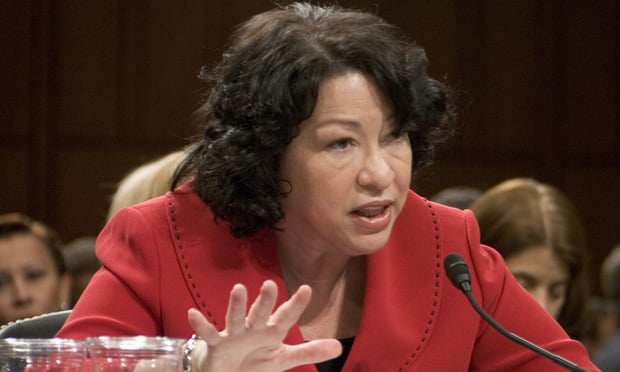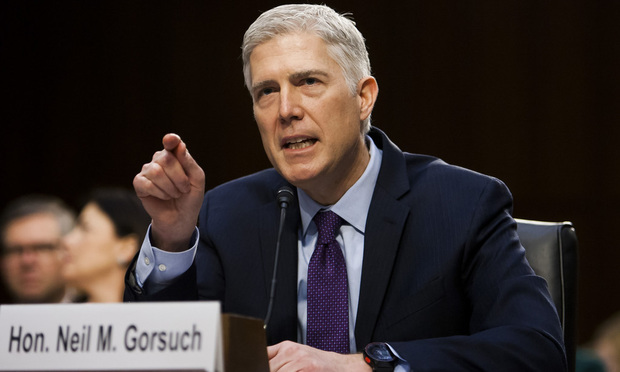'Troubling Dicta' by Gorsuch in Death Case Draws Sotomayor Rebuke
“Last-minute stays should be the extreme exception, not the norm," Gorsuch wrote Monday. Sotomayor was having none of it.
April 01, 2019 at 02:27 PM
6 minute read
The original version of this story was published on National Law Journal
 Sonia Sotomayor testifies in 2009 at her confirmation hearing. (Photo: Diego M. Radzinschi/ALM)
Sonia Sotomayor testifies in 2009 at her confirmation hearing. (Photo: Diego M. Radzinschi/ALM)
In a Missouri death row case on Monday, Justice Neil Gorsuch, perhaps reacting to sharp criticism of the court's refusal to delay the execution of an inmate who wanted his imam present in the death chamber, appeared to impose a new and higher bar on last-minute execution stays, drawing a rebuke from Justice Sonia Sotomayor.
“Last-minute stays should be the extreme exception, not the norm, and 'the last-minute nature of an application' that 'could have been brought' earlier, or 'an applicant's attempt at manipulation,' 'may be grounds for denial of a stay,'” Gorsuch wrote in his 5-4 majority opinion in Bucklew v. Precythe.
Gorsuch's two-page commentary at the end of his majority opinion was “troubling dicta” that was “wholly irrelevant” to the issue before the court, Sotomayor said in her dissent.
“I am especially troubled by the majority's statement that 'last-minute stays should be the extreme exception,' which could be read to intimate that late-occurring stay requests from capital prisoners should be reviewed with an especially jaundiced eye,” Sotomayor wrote.
The issue before the justices was not delays in execution, but whether Russell Bucklew's proposed alternative to execution by lethal injection—nitrogen hypoxia—met the high court's test of a feasible, reduced risk of severe pain. The majority held it did not.
Gorsuch, joined by Chief Justice John Roberts Jr. and Justices Clarence Thomas, Samuel Alito Jr. and Brett Kavanaugh, ended his 31-page opinion with two pages devoted to last-minute execution stays.
Gorsuch cited as an example the court's decision on Feb. 7 in Dunn v. Ray, a denial of an execution stay that would draw criticism from conservatives and liberals.
The divided court vacated a stay of execution imposed by a federal appellate court that wanted to hear Domineque Ray's religious discrimination claims. Ray argued the prison's refusal to allow an imam to attend him during his final moments violated the First Amendment's establishment clause.
The high court, over the dissenting votes of Justices Elena Kagan, Ruth Bader Ginsburg, Stephen Breyer and Sonia Sotomayor, gave no reason for its unsigned ruling. The majority only cited a 1992 decision holding that “a court may consider the last-minute nature of an application to stay execution in deciding whether to grant equitable relief.”
The decision triggered widespread criticism, which snowballed after the court, with Gorsuch and Thomas dissenting, on March 28 granted a stay of execution to a Texas inmate named Patrick Murphy. In that case, Murphy challenged the prison's refusal to allow his Buddhist spiritual advisor to accompany him into the death chamber. Kavanaugh joined the majority to block Murphy's execution.
There was little significant difference between the Ray and Murphy timelines in seeking stays of their executions, according to their lawyers. Some court watchers suggested the court's grant in Murphy's case may have been a reaction to the criticism the court received after denying Ray a stay to allow his imam to be by his side.
In a lengthy footnote on Monday, Gorsuch did not back down from the Ray decision. Gorsuch accused the Bucklew dissenters of “seeking to relitigate” Dunn v. Ray. He laid out for the first time the nature of the delay in Ray's case that prompted the majority to vacate the lower court stay.
Gorsuch claimed that a state statute had put Ray “long on notice” that there was a question as to whether his adviser could go into the execution chamber or had to remain outside.
 Judge Neil Gorsuch testifies before the Senate Judiciary Committee during the second day of his confirmation hearing. (Photo: Diego M. Radzinschi / ALM)
Judge Neil Gorsuch testifies before the Senate Judiciary Committee during the second day of his confirmation hearing. (Photo: Diego M. Radzinschi / ALM)“Yet although he had been on death row since 1999, and the state had set a date for his execution on November 6, 2018, he waited until January 23, 2019—just 15 days before the execution—to ask for clarification,” Gorsuch wrote. “He then brought a claim 10 days before the execution and sought an indefinite stay. This delay implicated the 'strong equitable presumption' that no stay should be granted 'where a claim could have been brought at such a time as to allow consideration of the merits without requiring entry of a stay.'”
Before addressing what she described as Gorsuch's “skewed view of the facts” in the Ray case, Sotomayor, in her dissenting opinion, wrote that Gorsuch's comments on last-minute stays if “mistaken for a new governing standard, they would effect a radical reinvention of established law and the judicial role.” The courts' equitable discretion in handling stay requests, she said, is governed by “well-established principles.”
Sotomayor then went footnote to footnote with her challenge to Gorsuch's view of the Ray facts.
“Even today's belated explanation from the majority rests on the mistaken premise that Domineque Ray could have figured out sooner that Alabama planned to deny his imam access to the execution chamber,” Sotomayor wrote. And she quoted from Kagan's dissent, which noted that “the prison refused to give Ray a copy of its own practices and procedures” that would have clarified the degrees of access by an imam or a Christian spiritual adviser.
Justice Stephen Breyer, who wrote the main dissent in Monday's case, more briefly at one point took on Gorsuch's use of the Ray decision to address delays in executions.
“In the view of some of us, the prisoner's claim—that prisoners of some faiths were entitled to have a minister present at their executions while prisoners of other faiths were not—raised a serious constitutional question,” Breyer said. “And therein lies the problem. It might be possible to end delays by limiting constitutional protections for prisoners on death row. But to do so would require us to pay too high a constitutional price.”
Read more:
Sotomayor Is 'Profoundly Troubled' by Georgia Death Penalty Case
SCOTUS Issues Eleventh-Hour Stay in Execution of Texas Buddhist Inmate
Kagan's Scathing Death Row Dissent Highlights Central Voice on Religion
Public Safety Depends on Juries Chosen Without Racial Discrimination
Sotomayor's Barbed Dissent in Death Penalty Case Charges 'Rush to Execute'
This content has been archived. It is available through our partners, LexisNexis® and Bloomberg Law.
To view this content, please continue to their sites.
Not a Lexis Subscriber?
Subscribe Now
Not a Bloomberg Law Subscriber?
Subscribe Now
NOT FOR REPRINT
© 2025 ALM Global, LLC, All Rights Reserved. Request academic re-use from www.copyright.com. All other uses, submit a request to [email protected]. For more information visit Asset & Logo Licensing.
You Might Like
View All
Bringing the Courts Into the 'Google Age': An Assessment of the New York Judiciary's Pandemic Response

What the End of the National COVID Emergency Could Mean for Remote Federal Court Proceedings

Some Thoughts on Remote Advocacy From a Judge Who's Spent a Lot of Time Chewing On The Subject

State and Federal Courts Diverge in How They've Tackled the Pandemic
Trending Stories
- 15th Circuit Considers Challenge to Louisiana's Ten Commandments Law
- 2Crocs Accused of Padding Revenue With Channel-Stuffing HEYDUDE Shoes
- 3E-discovery Practitioners Are Racing to Adapt to Social Media’s Evolving Landscape
- 4The Law Firm Disrupted: For Office Policies, Big Law Has Its Ear to the Market, Not to Trump
- 5FTC Finalizes Child Online Privacy Rule Updates, But Ferguson Eyes Further Changes
Who Got The Work
J. Brugh Lower of Gibbons has entered an appearance for industrial equipment supplier Devco Corporation in a pending trademark infringement lawsuit. The suit, accusing the defendant of selling knock-off Graco products, was filed Dec. 18 in New Jersey District Court by Rivkin Radler on behalf of Graco Inc. and Graco Minnesota. The case, assigned to U.S. District Judge Zahid N. Quraishi, is 3:24-cv-11294, Graco Inc. et al v. Devco Corporation.
Who Got The Work
Rebecca Maller-Stein and Kent A. Yalowitz of Arnold & Porter Kaye Scholer have entered their appearances for Hanaco Venture Capital and its executives, Lior Prosor and David Frankel, in a pending securities lawsuit. The action, filed on Dec. 24 in New York Southern District Court by Zell, Aron & Co. on behalf of Goldeneye Advisors, accuses the defendants of negligently and fraudulently managing the plaintiff's $1 million investment. The case, assigned to U.S. District Judge Vernon S. Broderick, is 1:24-cv-09918, Goldeneye Advisors, LLC v. Hanaco Venture Capital, Ltd. et al.
Who Got The Work
Attorneys from A&O Shearman has stepped in as defense counsel for Toronto-Dominion Bank and other defendants in a pending securities class action. The suit, filed Dec. 11 in New York Southern District Court by Bleichmar Fonti & Auld, accuses the defendants of concealing the bank's 'pervasive' deficiencies in regards to its compliance with the Bank Secrecy Act and the quality of its anti-money laundering controls. The case, assigned to U.S. District Judge Arun Subramanian, is 1:24-cv-09445, Gonzalez v. The Toronto-Dominion Bank et al.
Who Got The Work
Crown Castle International, a Pennsylvania company providing shared communications infrastructure, has turned to Luke D. Wolf of Gordon Rees Scully Mansukhani to fend off a pending breach-of-contract lawsuit. The court action, filed Nov. 25 in Michigan Eastern District Court by Hooper Hathaway PC on behalf of The Town Residences LLC, accuses Crown Castle of failing to transfer approximately $30,000 in utility payments from T-Mobile in breach of a roof-top lease and assignment agreement. The case, assigned to U.S. District Judge Susan K. Declercq, is 2:24-cv-13131, The Town Residences LLC v. T-Mobile US, Inc. et al.
Who Got The Work
Wilfred P. Coronato and Daniel M. Schwartz of McCarter & English have stepped in as defense counsel to Electrolux Home Products Inc. in a pending product liability lawsuit. The court action, filed Nov. 26 in New York Eastern District Court by Poulos Lopiccolo PC and Nagel Rice LLP on behalf of David Stern, alleges that the defendant's refrigerators’ drawers and shelving repeatedly break and fall apart within months after purchase. The case, assigned to U.S. District Judge Joan M. Azrack, is 2:24-cv-08204, Stern v. Electrolux Home Products, Inc.
Featured Firms
Law Offices of Gary Martin Hays & Associates, P.C.
(470) 294-1674
Law Offices of Mark E. Salomone
(857) 444-6468
Smith & Hassler
(713) 739-1250






